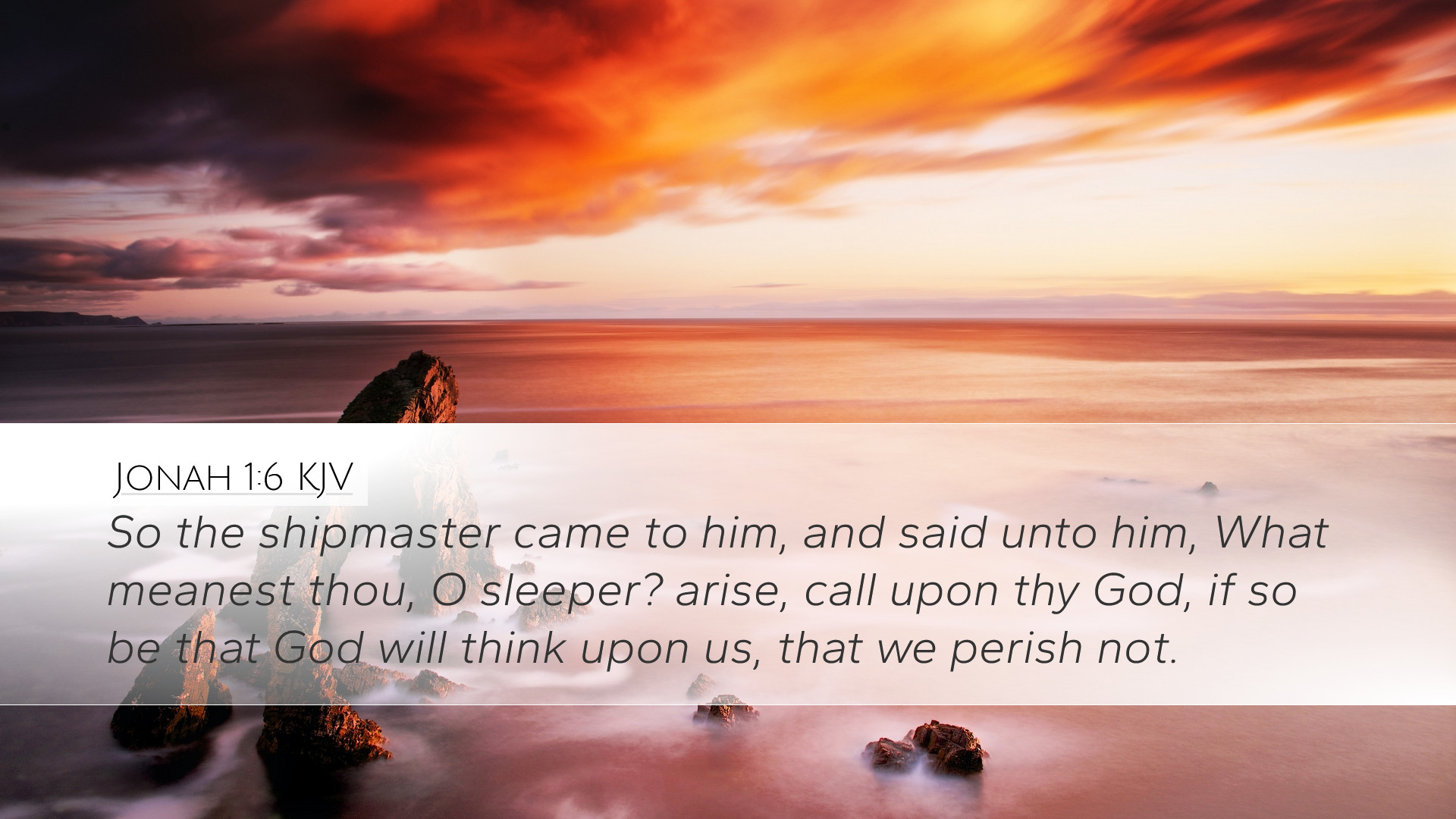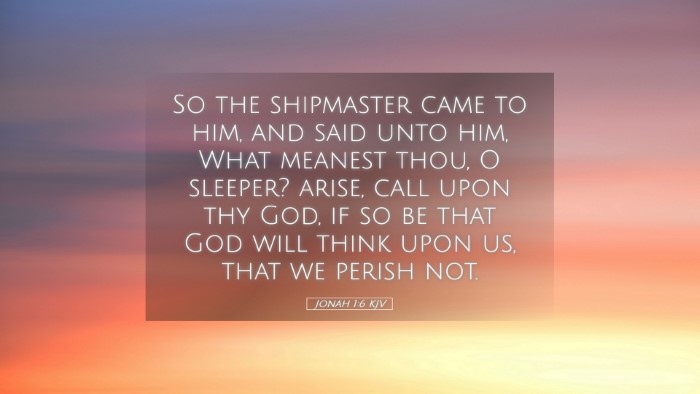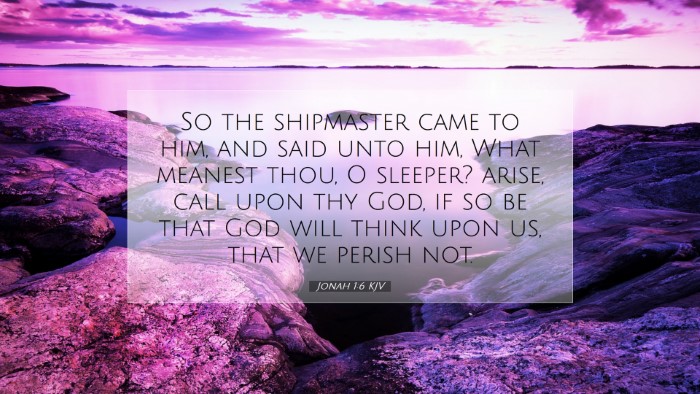Old Testament
Genesis Exodus Leviticus Numbers Deuteronomy Joshua Judges Ruth 1 Samuel 2 Samuel 1 Kings 2 Kings 1 Chronicles 2 Chronicles Ezra Nehemiah Esther Job Psalms Proverbs Ecclesiastes Song of Solomon Isaiah Jeremiah Lamentations Ezekiel Daniel Hosea Joel Amos Obadiah Jonah Micah Nahum Habakkuk Zephaniah Haggai Zechariah MalachiJonah 1:6
Jonah 1:6 KJV
So the shipmaster came to him, and said unto him, What meanest thou, O sleeper? arise, call upon thy God, if so be that God will think upon us, that we perish not.
Jonah 1:6 Bible Commentary
Commentary on Jonah 1:6
Verse: "So the shipmaster came to him, and said unto him, What meanest thou, O sleeper? arise, call upon thy God, if so be that God will think upon us, that we perish not." (Jonah 1:6)
Introduction
The verse serves as a pivotal moment in the narrative of Jonah, encapsulating the themes of divine intervention, human responsibility, and the futility of running from God. As we explore the insights of esteemed public domain commentators like Matthew Henry, Albert Barnes, and Adam Clarke, we can appreciate the layers of meaning found within this text.
Contextual Analysis
This verse occurs during a tempestuous sea voyage as Jonah attempts to escape God’s command to preach repentance to Nineveh. The situation aboard the ship mirrors Jonah's internal turmoil and serves as an illustration of God's sovereignty in the midst of human disobedience.
Henry's Perspective: Matthew Henry notes the irony of a prophet sleeping during a crisis that others perceive as a threat to their lives. His somnolence suggests spiritual apathy and neglect of his prophetic duty, illustrating a deeper truth about the church's state amid worldly turmoil.
The Shipmaster's Alarm
Barnes’ Commentary: Albert Barnes emphasizes the shipmaster’s frantic efforts to rouse Jonah. The captain’s admonition, “What meanest thou, O sleeper?” reflects both desperation and a challenge to Jonah's moral and spiritual responsibilities. Barnes suggests that while the mariners sought divine assistance through their own means, they were unaware of the one person aboard who had direct access to the God responsible for the storm.
- Irony of Innocence: The pagan shipmaster's urgent plea to Jonah invokes a poignant irony; those typically perceived as righteous—God's chosen prophet—is in fact the source of impending disaster.
- Call to Divine Action: The captain's exhortation to “call upon thy God” reflects an organic inclusivism, recognizing that amidst the chaos, any appeal to God could potentially avert catastrophe.
Call to Righteousness
Clarke's Insights: Adam Clarke explains the shipmaster's actions as a desperate plea for help. Clarke notes the humanity of the shipmaster—a portrayal of someone who, amidst their own fears, attempts to inspire faith within another. This incident highlights the call to righteousness and the recognition that prayer is the best course of action in times of distress.
- Role of Intercessory Prayer: The captain’s appeal for prayer emphasizes the theme of intercession, a reminder of our responsibility to pray not only for ourselves but for others around us.
- Urgency in Crisis: The phrase “if so be that God will think upon us” indicates the shipmaster's hopefulness but also reflects a lack of assurance in understanding God's character. This plea is a deep expression of vulnerability in the face of divine will.
Theological Implications
Jonah 1:6 raises important theological issues that resonate through the scriptures:
- Sovereignty of God: This verse illustrates God’s control over natural events and human paths, drawing attention to how our actions align with or diverge from God's will.
- Human Responsibility: Jonah's reluctance to fulfill his prophetic duty serves as a cautionary tale about the consequences of disobedience. The wake-up call from the shipmaster symbolizes a need for awakening among believers to their responsibilities.
- God's Mercy: The captain's cry implies the hope of God's intervention—there rests a profound message of mercy, emphasizing that even in disobedience, there is an opportunity for repentance and reliance upon God.
Conclusion
In summary, Jonah 1:6 reveals a critical juncture in which divine providence confronts human apathy. The shipmaster's desperate call for Jonah to arise and pray encapsulates the struggles faced by both the individual and community as they navigate crises. Through the commentary of Henry, Barnes, and Clarke, one can see the rich textures of meaning woven into this narrative, illustrating a timeless message for those in ministry, scholarship, and personal faith journeys. "What meanest thou, O sleeper?" challenges all believers to awaken to their callings, lest they become passive in the very chaos that demands our action and faith.


